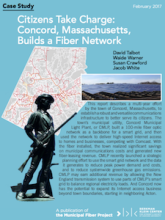
Fast, affordable Internet access for all.


When Paul Revere rode through Concord, Massachusetts, to warn the Colonists about the Red Coats, horseback was the fastest way to move information. More than 240 years later, the community that was so instrumental to founding of the United States as we know it now sends information via their own fast, affordable, reliable Fiber-to-the-Home (FTTH) municipal network. This week, Concord's former CIO Mark Howell joins Christopher to talk about the community and their investment.
Mark discusses the community's history and the story of the network, which includes their reasons for investing in the infrastructure. He talks about the local citizens' enthusiasm for the project and what it was like to go from operating an electric utility to adding Internet access for the public. Mark also discusses the funding mechanism that Concord used to pay for the project and shares a few of the many benefits that the network has brought to Concord and its people.
Christopher and Mark review the reasoning behind the different service offerings available to subscribers and the rationale behind choosing these tiers. They also talk about some of the challenges Concord has faced and Mark gets into the possibilities of regional efforts in order to maximize the possibility of reaching more households.
Read more about the network in the 2017 report published by the Berkman Klein Center for Internet & Society, Citizens Take Charge: Concord, Massachusetts, Builds a Fiber Network.
This show is 28 minutes long and can be played on this page or via Apple Podcasts or the tool of your choice using this feed.
Transcript below.
We want your feedback and suggestions for the show-please e-mail us or leave a comment below.
Listen to other episodes here or view all episodes in our index. See other podcasts from the Institute for Local Self-Reliance here.
Thanks to Arne Huseby for the music. The song is Warm Duck Shuffle and is licensed under a Creative Commons Attribution (3.0) license.

A new case study recently released by the Berkman Klein Center for Internet & Society at Harvard University describes how the community of Concord, Massachusetts deployed its extensive municipal fiber-optic network and smart grid. In Citizens Take Charge: Concord, Massachusetts, Builds a Fiber Network, the authors offer history, and describe the benefits to the community from better connectivity and enhanced electric efficiencies.
Key Findings from the report:
It’s no small feat to plan, deploy, and operate a municipal citywide Fiber-to-the-Home (FTTH) network, but communities are doing it. We’ve put together a Citywide Municipal FTTH Networks list and a map, with quick facts at your fingertips. If your community is considering such an investment, this list can offer a starting point on discovering similarly situated locations to study.
The list is divided by state and each state heading offers a description of any barriers that exist and a link to the statute in question. Under each community, we also included relevant links such as to the provider’s website, coverage on MuniNetworks.org, and reports or resources about the network.
We used four basic criteria to put a community on our list and map:
Share the list far and wide and if you know of a community network that meets our criteria that we missed, please let us know. Contact H. Trostle at htrostle@ilsr.org to suggest additions.
Concord, Massachusetts, has a strong literary history with famous authors like Thoreau, Emerson, and the Alcott sisters, but all puns aside, the town also has a long-standing community broadband network, Concord Light Broadband.
Years ago, the community voted to build its own network from their electric utility, and they have just now transitioned to high-speed fiber optics.
From Electric to Broadband
Concord is one of only forty Massachusetts municipalities with an electric utility and in the early 2000s, their electric thermal storage system needed an overhaul. The technology, based on the phone system’s network, was becoming obsolete. The electric utility chose to overbuild the existing system with fiber optics in order to create a smart-grid to automatically read electric meters. Concord recognized the opportunity presented by a fiber network backbone spread throughout town.
It only made sense to look at broadband options; the only thing left to do was to build out the last-mile, the section of network that connects to the home or business. They estimated the cost for the smart-grid and last-mile to be $4 million and would finance it through municipal bonds.
Once Bitten, Twice Shy of Big Incumbent Cable Companies
Large incumbent cable companies had not served the community well and the people wanted better connectivity. Massachusetts’ state law requires a town to vote at two consecutive town meetings to establish the authority to build a broadband network through the electric utility, commonly referred to as Municipal Light Plant or MLP. The MLP is the town department responsible for the transmission and supply of electricity to the residents and businesses in the town. As communities have started to develop their own municipal Internet networks, the MLPs have also taken on a similar role with regard to connectivity. After establishment of an MLP is approved, then the community votes again on funding for the initiative.
In 2003, the people of Concord began considering what they could accomplish with a municipal network, and they held the first vote at the Annual Town Meeting. The resolution passed by a 2/3rds majority vote. The second Annual Town Meeting was scheduled for April 2004.